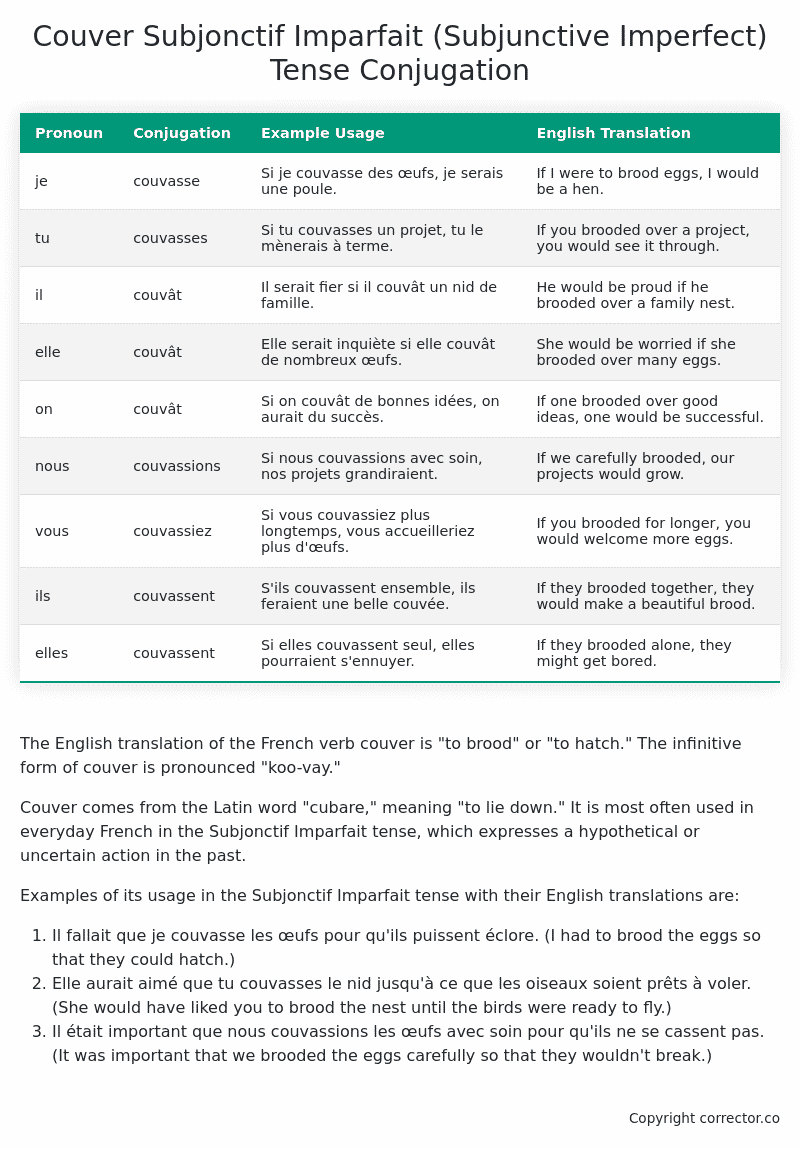Subjonctif Imparfait (Subjunctive Imperfect) Tense Conjugation of the French Verb couver
Introduction to the verb couver
The English translation of the French verb couver is “to brood” or “to hatch.” The infinitive form of couver is pronounced “koo-vay.”
Couver comes from the Latin word “cubare,” meaning “to lie down.” It is most often used in everyday French in the Subjonctif Imparfait tense, which expresses a hypothetical or uncertain action in the past.
Examples of its usage in the Subjonctif Imparfait tense with their English translations are:
- Il fallait que je couvasse les œufs pour qu’ils puissent éclore. (I had to brood the eggs so that they could hatch.)
- Elle aurait aimé que tu couvasses le nid jusqu’à ce que les oiseaux soient prêts à voler. (She would have liked you to brood the nest until the birds were ready to fly.)
- Il était important que nous couvassions les œufs avec soin pour qu’ils ne se cassent pas. (It was important that we brooded the eggs carefully so that they wouldn’t break.)
Table of the Subjonctif Imparfait (Subjunctive Imperfect) Tense Conjugation of couver
| Pronoun | Conjugation | Example Usage | English Translation |
|---|---|---|---|
| je | couvasse | Si je couvasse des œufs, je serais une poule. | If I were to brood eggs, I would be a hen. |
| tu | couvasses | Si tu couvasses un projet, tu le mènerais à terme. | If you brooded over a project, you would see it through. |
| il | couvât | Il serait fier si il couvât un nid de famille. | He would be proud if he brooded over a family nest. |
| elle | couvât | Elle serait inquiète si elle couvât de nombreux œufs. | She would be worried if she brooded over many eggs. |
| on | couvât | Si on couvât de bonnes idées, on aurait du succès. | If one brooded over good ideas, one would be successful. |
| nous | couvassions | Si nous couvassions avec soin, nos projets grandiraient. | If we carefully brooded, our projects would grow. |
| vous | couvassiez | Si vous couvassiez plus longtemps, vous accueilleriez plus d’œufs. | If you brooded for longer, you would welcome more eggs. |
| ils | couvassent | S’ils couvassent ensemble, ils feraient une belle couvée. | If they brooded together, they would make a beautiful brood. |
| elles | couvassent | Si elles couvassent seul, elles pourraient s’ennuyer. | If they brooded alone, they might get bored. |
Other Conjugations for Couver.
Le Present (Present Tense) Conjugation of the French Verb couver
Imparfait (Imperfect) Tense Conjugation of the French Verb couver
Passé Simple (Simple Past) Tense Conjugation of the French Verb couver
Passé Composé (Present Perfect) Tense Conjugation of the French Verb couver
Futur Simple (Simple Future) Tense Conjugation of the French Verb couver
Futur Proche (Near Future) Tense Conjugation of the French Verb couver
Plus-que-parfait (Pluperfect) Tense Conjugation of the French Verb couver
Passé Antérieur (Past Anterior) Tense Conjugation of the French Verb couver
Futur Antérieur (Future Anterior) Tense Conjugation of the French Verb couver
Subjonctif Présent (Subjunctive Present) Tense Conjugation of the French Verb couver
Subjonctif Passé (Subjunctive Past) Tense Conjugation of the French Verb couver
Subjonctif Imparfait (Subjunctive Imperfect) Tense Conjugation of the French Verb couver (this article)
Subjonctif Plus-que-parfait (Subjunctive Pluperfect) Tense Conjugation of the French Verb couver
Conditionnel Présent (Conditional Present) Tense Conjugation of the French Verb couver
Conditionnel Passé (Conditional Past) Tense Conjugation of the French Verb couver
L’impératif Présent (Imperative Present) Tense Conjugation of the French Verb couver
L’infinitif Présent (Infinitive Present) Tense Conjugation of the French Verb couver
Struggling with French verbs or the language in general? Why not use our free French Grammar Checker – no registration required!
Get a FREE Download Study Sheet of this Conjugation 🔥
Simply right click the image below, click “save image” and get your free reference for the couver Subjonctif Imparfait tense conjugation!

Couver – About the French Subjonctif Imparfait (Subjunctive Imperfect) Tense
Formation
Common Everyday Usage Patterns
Interactions with Other Tenses
Subjonctif Présent
Indicatif Passé Composé
Conditional
Conditional Perfect
Summary
I hope you enjoyed this article on the verb couver. Still in a learning mood? Check out another TOTALLY random French verb conjugation!


